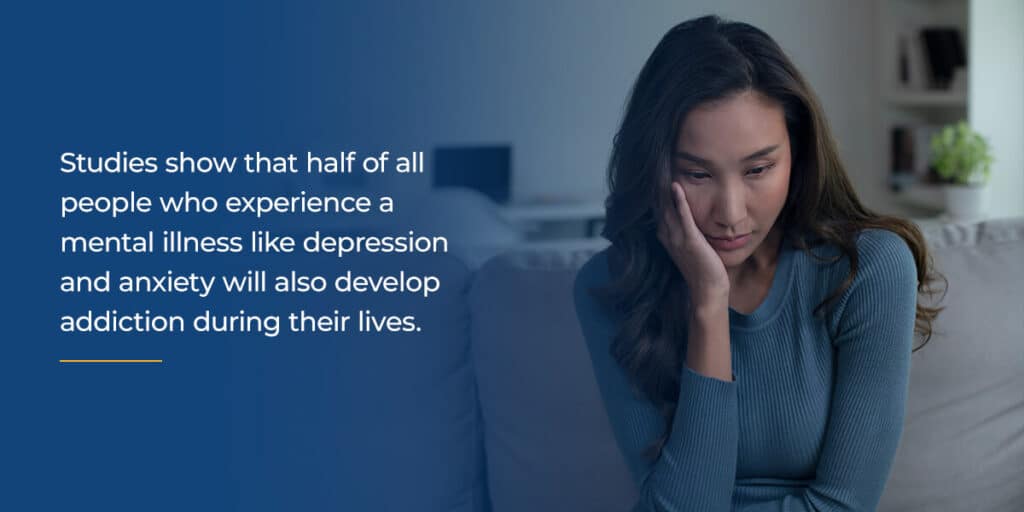

Mental health and opioid addiction are connected in various ways. Long-term opioid use, whether illicit or prescribed, can worsen symptoms of mental health conditions like depression and anxiety. At the same time, depression and anxiety might cause a person to self-medicate with opioids. Either way, addiction can have a severe impact on mental health.
Fortunately, you can find effective treatments for opioid addiction and its co-occurring conditions. If you or someone you know is struggling, a professional dual diagnosis program can help improve your mental health and get you on a healthy path to recovery.
Opioids are a class of drugs that include prescription pain relievers like OxyContin, synthetic opioids like fentanyl and the illicit substance heroin. These substances act on the opioid receptors in our brains to produce feel-good chemicals and are often prescribed medically for pain relief. However, they are frequently used non-medically for their euphoric effects.
Side effects of opioids can include:
Long-term opioid use can lead to tolerance and physical dependence. Tolerance occurs when you require higher doses to get the same effects and physical dependence causes uncomfortable withdrawal symptoms when you attempt to stop. As a result, many people can get trapped in a cycle of prolonged opioid use. Addiction can significantly impact a person’s life, including their mental and physical health, career prospects and relationships.
Here are a few signs of opioid addiction to look out for in someone you know:
Opioid use disorder (OUD) can also increase a person’s risk of respiratory depression by lowering or stopping breathing. Opioid overdoses kill more than 136 Americans every day. The risk can increase when you combine opioids with other medications like benzodiazepines.

The link between opioid use and mental health has been the focus of much scientific research. Studies show that half of all people who experience a mental illness like depression and anxiety will also develop addiction during their lives. Some people might take opioids for depression and anxiety, believing these substances can help with low moods due to the initial euphoria. However, addiction can worsen depressive symptoms like low motivation, irritability and sadness, causing a problematic cycle.
These substances bind to opioid receptors in the brain, impacting our pain and pleasure response. Prolonged use can cause the body to produce less natural feel-good chemicals like dopamine when it becomes accustomed to the opioid. In the long term, opioid addiction can impact a person’s ability to feel pleasure.
Substance use tends to occur in early adolescence when children transition into adulthood. This period can result in stressful changes. If people don’t receive help to cope with the changes, they might be more vulnerable to unhealthy behaviors like opioid use.
People with opioid addiction often have co-occurring mental health conditions. Symptoms can trigger opioid use and make it more difficult to escape the cycle of addiction. Regardless of whether mental illness contributes to opioid dependence or is started by opioid use, it helps to understand these conditions better to seek treatment as soon as possible.
Depression is a mood disorder that causes intense sadness and a loss of interest in activities you once enjoyed. Symptoms often include:
One study found that patients with depression who take prescription opioids are at a higher risk of developing OUD. Additionally, people who develop depression after taking opioids over a long time can experience more severe depression symptoms than others.
Several factors might influence the risk of depression. Opiates can cause depression symptoms like sleep disturbances and social isolation. People can also experience depression from opiate withdrawal. Additionally, you might reach for opioids to improve your mood. However, long-term use can only worsen symptoms of mental health conditions.
Anxiety disorders are mood disorders that cause intense and excessive feelings of fear and worry about everyday situations. There are many types of anxiety disorders, with common ones including generalized anxiety disorder (GAD), social anxiety and panic disorder.
Symptoms of anxiety include:
Many people with anxiety disorders use opioids to calm down or cope with specific symptoms, which can worsen the condition and make it difficult to break out of the cycle of dependence. People with long-term OUD are also more likely to develop anxiety than those who do not take opioids. These substances can induce anxiety symptoms like paranoia, agitation and trouble sleeping.
Anxiety symptoms can also arise during withdrawal, making it hard to stop without professional treatment.
Post-traumatic stress disorder (PTSD) is a condition that often develops after a person experiences or witnesses a traumatic event. While common among military veterans, PTSD can occur after a traumatic event, such as an assault, car accident or near-death experience
Symptoms of PTSD include:
While opioid use cannot cause PTSD, 41% of people with the condition also have OUD, suggesting that many patients might use substances to cope with symptoms and avoid traumatic memories. Additionally, seeking and obtaining illicit substances can expose people to traumatic situations like violence. As a result, people with addiction are five times more likely to experience traumatization than people without addiction.
Suicidal ideation involves feelings, thoughts and actions that cause you to want to end your life. Approximately 3.1 million Americans experienced suicidal ideation in 2019. Symptoms can include:
Suicidal ideation often co-occurs with other mental health conditions, like depression and PTSD. Additionally, people with OUD are at a higher risk of suicidal ideation and attempts. The Centers for Disease Control and Prevention (CDC) estimates that 7% of opioid overdose deaths result from suicides.
Since opioids can worsen mental health conditions, they can also increase the frequency of suicidal thoughts. You might feel isolated, hopeless or unsure of how to break the addiction cycle. If you or someone you know experiences suicidal ideation, seek emergency help immediately. Professional opioid addiction treatment programs can also help you when you’re struggling with depressive thoughts and need a support system to turn to.
While opioid use disorder and mental health conditions can create a complex cycle, know you are never alone. At Hope for Tomorrow, we provide counseling, medication-assisted treatment and other crucial services to help you recover. Our compassionate counselors and addiction experts can help you with symptoms of co-occurring conditions for more effective, comprehensive support.
Learn more about starting your recovery journey or call us at 877-679-8162 today.